
31 minute read
FACULTY RESEARCH SUMMARIES
#EMORYTOGETHER: GOIZUETA ALUMNI HELP FIGHT COVID-19
By Michelle Valigursky
Advertisement
The fallout from COVID-19 is affecting every aspect of society, from public health to businesses to community and family life. In these difficult and uncertain times, people from all walks of life are coming together to take action to counteract the impact of the virus, including Goizueta alumni at leading organizations across the globe.
“The COVID-19 pandemic continues to challenge the business status quo like never before,” said Amelia Schaffner, director of entrepreneurship at Goizueta. “Entrepreneurial resilience in the face of adversity, relentless problem hacking and pivoting to new needs are critical components for companies to not only endure a major economic shift such as this, but also emerge stronger once the pandemic subsides.”
While the United States continues the rolling process of reopening businesses and defining a “new normal,” the pandemic is far from over. “The international community is working together like never before to produce a coronavirus vaccine,” said Elissa Prichep 08MBA, project lead for precision medicine at the World Economic Forum. In her recent article on the forum’s website, she stated, “If a vaccine is developed in the timeline predicted, then people will have a preventative option should COVID-19 recirculate next year. Protection from the virus will save lives and help society return to functioning as normal.”
Prichep noted, “This timeline feels excruciatingly long as the coronavirus pandemic continues to ravage the world around us. But it deserves some context. New technologies combined with international cooperation to fight infectious diseases are enabling faster responses to new disease outbreaks, shaving several years from traditional vaccine development timelines.”
Funding global efforts like vaccine development is a key priority. Jeff Miller 10MBA is senior director of global creative strategy for Snapchat. “Now, people are leaning into the platform, connecting with close friends and family when they can’t be face-to-face,” he said. For World Health Day on April 7, his team created an innovative way to fund the United Nations COVID-19 Solidarity Response Fund for the World Health Organization. “We’re encouraging Snapchatters around the world to take action in response to the pandemic by showing them that every dollar can make a difference. Their loose bills can make real change. We launched the first-ever global donation augmented reality (AR) marker experience on Snapchat to raise funds for hospitals, medical supplies and research and development,” Miller said of the
campaign developed in under two weeks in 11 languages across 33 countries. For this ongoing initiative, “With marker technology, Snapchatters can hold bank notes in front of their cameras to trigger AR visualizations of the causes that the fund supports.”
Emergency room doctor Angela Fusaro 01C 17WEMBA cofounded Physician 360, which now operates in 50 states providing convenient, cost-effective and diagnostically accurate care for common medical illnesses such as anemia, urinary tract infection, strep throat and flu. When the coronavirus pandemic took hold, the infrastructure of Physician 360’s direct-to-consumer model was already in place to handle increased demand for virtual medical care. At the onset of the pandemic, the company built a resource database of testing sites for patients who were at risk and needed access to confirmatory testing. Now, an individual who may have been exposed to coronavirus can purchase a consultation through the smart phone app or the website. Working alongside local pharmacies, board-certified physicians will then guide eligible candidates through the process in their state for coronavirus testing if screening indicates they may
have the virus. Physician 360 is working to expand the scope of its low-cost and convenient testing capabilities, including COVID-19 antibody testing. “Seeing the overcomplexity and excessive cost in the health system, I want to be part of the solution to these inefficiencies and not just work within a broken system,” Fusaro said. In these medically challenging times, “For people who can’t wait for a doctor’s appointment, or don’t want to be exposed to others' germs, telemedicine is an innovative solution.”
“Healthcare professionals, scholars and public agencies are creating enormous amounts of data on COVID-19, but it’s highly fragmented,” said Eric Crane 09BBA, chief operating officer and cofounder of Flatfile, which helps companies import and manage data. That's why his team accelerated the launch of their latest venture, CSV.org, in collaboration with scientists from Massachusetts Institute of Technology (MIT) and University of California, Los Angeles (UCLA) as well as technologists at Google and Airtable. Crane explained, "With CSV. org, we're doing what we do best: aggregating, healing and normalizing data. Only instead of doing this for

To increase the United Nations Foundation’s COVID-19 Solidarity Response Fund, Snapchat uses augmented reality lenses created by Jeff Miller 10MBA to capture donations from Snapchatters around the world.
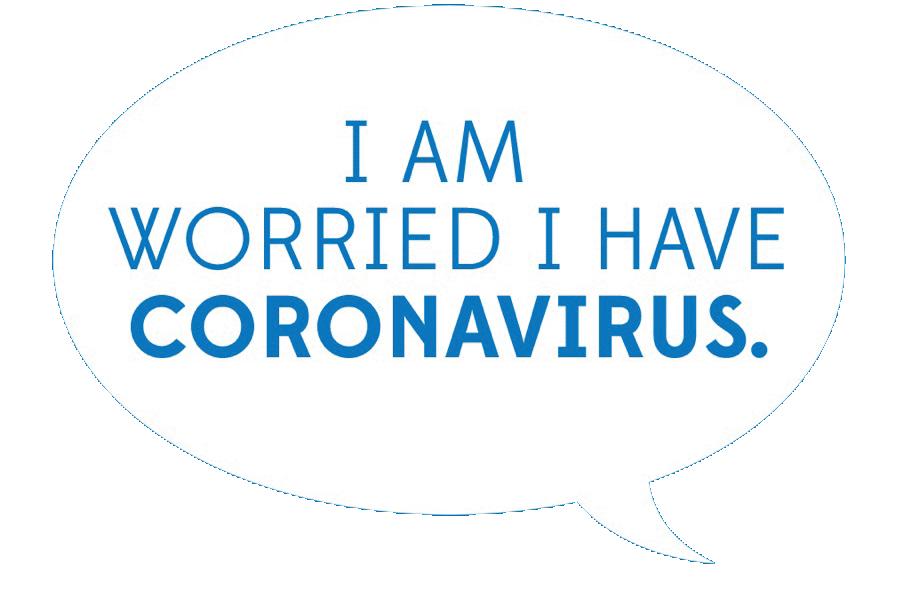
Physician 360, cofounded by Angela Fusaro 01C 17WEMBA, offers an assessment based on CDC guidelines to provide immediate video medical consultations and screening diagnosis for coronavirus with recommendations for treatment and testing plans. Consultations are Health Savings Account (HSA) and Flexible Spending Account (FSA) eligible.
companies, our goal is to make all public data easily accessible." The site offers a curated and normalized set of thousands of global metrics free of charge, with an initial focus on COVID-19 data. "We aren't scientists or journalists, but we can do our part to make those experts' jobs easier," he added.
Changing conditions demand swift response from businesses
Factory shutdowns and consumer hoarding may have temporarily impacted the natural flow of our nation’s supply and demand, but businesses are keenly aware of changing customer needs. Arming frontline healthcare workers and patients has taken top priority across the world as the virus continues to spread. Personal Protective Equipment (PPE) to minimize hazardous and potentially illnesscausing exposure is in limited supply, yet Goizueta alumni and the companies they work for are stepping in to quickly change that reality.
INVISTA, a division of Koch Industries, is known for its innovations in the nylon, spandex, polyester and specialty materials industries. Renita Jones Anderson 02EMBA, marketing director, and Daryl Lipscomb 10WEMBA, global sales director, shared news about the company’s responsiveness to COVID-19. “INVISTA’s Kingston, Ontario, manufacturing plant has been able to respond quickly by providing nylon 6,6 fiber for medical isolation gowns in the United States and Canada without a change in our equipment,” Lipscomb noted. “As a key supplier of this fiber to the global airbag industry for nearly 50 years, we are grateful that our products are going into these gowns and helping to protect people in a different way.” In response to economic challenges faced by the retail sector, Vice President of STAINMASTER Brook Brown 10WEMBA explained, “STAINMASTER brand has quickly developed a simple 3-step process supporting local businesses, allowing them access to corporate-level tools that provide them a way to sell flooring virtually,” she said. “Supported by customer leads driven by the national brand, local retailers are being allowed to keep their storefronts (virtually) open at a time when many other businesses are being forced to shut down.”
Preparing individuals on the front lines to safely protect themselves against COVID-19 has evoked tremendous response across businesses. Linda Burhance 95EMBA, vice president of product development for United States Class I medical device manufacturer The Marena Group, designed a reusable antibacterial non-surgical PPE mask. These masks meet the criteria of the FDA guidance for a Class I medical device to be used by the general public and by healthcare professionals in a healthcare setting under the Emergency Use Authorization Act. The one-size-fitsall devices can be washed without losing effectiveness and can be worn over N95 respirators or on their own. “Many personal protective devices (PPDs) can cause some facial bruising or irritation,” Burhance said. Marena’s proprietary TriFlex fabric has been used in healthcare settings for many years and

Through its sewing academy Amani Women Center is “Stitching Lives Together” by putting refugee women sewers to work making 100% cotton masks using donated and purchased supplies. “By hiring these women, we help put food on their family tables,” Doris Mukangu 17MPH said. Linda Burhance 95EMBA is vice president of product development at The Marena Group. The manufacturer is now producing tens of thousands of washable antibacterial face masks each week for distributors in the United States, Mexico, Japan, Australia and other communities around the world. With over 25 years in the healthcare sector, Marena products are sold in 60 countries globally.
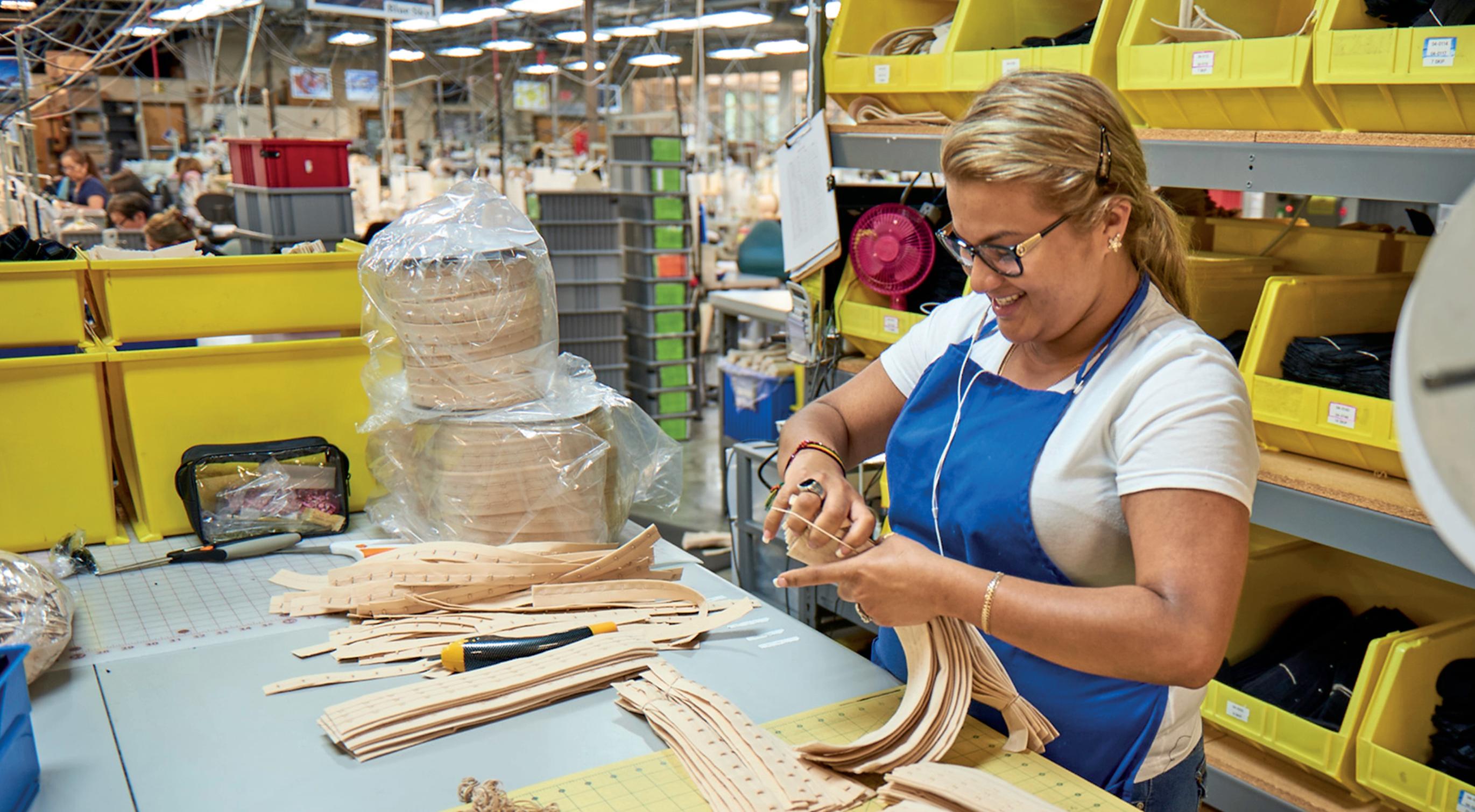
contains an active silver ingredient with antibacterial properties that is familiar to those in the medical field. “I designed a mask to be breathable and soft against the skin yet still protect the face, nose and mouth against respiratory droplets, germ particles and splashes.”
Also rising to the challenge is Doris Mukangu 17MPH, founder of the Amani Women Center in Clarkston, Georgia, which empowers and provides support to refugees. As an Emory-trained public health professional and now a nonprofit leader, Mukangu specializes in prevention. “I understand very well the importance of taking all preventive measures when it comes to a pandemic like COVID-19. We are currently supplying sewn masks not just to healthcare workers in hospitals like Emory and the Clarkston Community Health Center but also to police forces, public work departments, post office workers and many businesses,” said Mukangu,
a graduate of Goizueta’s Start:ME accelerator, a 14-session training program for small business owners. “Masks are also available through the website not only to frontline workers but to the general public as well.”
In addition, the Amani Women Center provides timely information from the Georgia Department of Health to the refugee community. Using social media platforms in languages area refugees can understand, “We have become a trusted voice to provide credible and digestible information from the Georgia Department of Public Health (DPH) and Centers for Disease Control and Prevention (CDC) to a community that has linguistic and literacy challenges.” She added, “Refugees are resilient, and they want to give back to a country that has been so welcoming to them.” Our country, struggling with coronavirus on many fronts, “is the country they now call home.” n
Editor’s Note: Have you or your company responded to the COVID-19 pandemic or helped to mitigate its impact? Please use the hashtag #EmoryTogether when you share your stories and images and mention us on Twitter, LinkedIn, Facebook and Instagram. We will periodically share stories on EmoryBusiness.com and social media posts on the myriad ways our alumni are involved in this effort.

EMPOWERING VIRTUAL TEAMS NOW AND IN THE FUTURE By Allison Shirreffs
In February 2020, as cases of coronavirus began appearing outside of China, corporate human resource departments scrambled to come up with policies to deal with the fallout from the virus. Policies that included banning non-essential travel. Twitter’s chief human resources officer, Jennifer Christie, mandated that its staff in three Asian countries work remotely, writing in a blog post that the company was “strongly encouraging” the remainder of its 5,000 global employees to work from home due to the virus. Christie went on to write, “While this is a big change for us, we have already been moving towards a more distributed workforce that’s increasingly remote.”

The reason companies such as Twitter are moving to distributed workforces isn’t to combat future viral outbreaks. It’s because top talent doesn’t always live within commuting distance of a company’s headquarters. And even when the majority of a company’s workforce is tethered to a physical office, most of them don’t want to be there every day. According to “The Remote Work Report,” published by Zapier.com in November 2019, “95 percent of U.S. knowledge workers want to work remotely and 74 percent would be willing to quit a job to do so.” And nearly 60 percent of knowledge workers (those employees whose main capital is information and the flow of information) say that working remotely is “one of the perks they’d most prefer to be offered” by an employer—ranking well above extras like daily free lunch or unlimited vacation time.
Sandy Jap, Sarah Beth Brown Professor in Marketing
That said, companies wouldn’t be able to embrace remote workers without recent innovations in technology that make a remote workforce efficient and effective. From fast and consistent connectivity to improvements in webinar applications such as WebEx and Zoom, the quality of virtual communications has created a viable alternative to travel and led to changes in organizational practices and processes. This, in turn, has led to an increase in virtual employment structures, including the ability to create wellfunctioning virtual teams of “distributed expertise” that aren’t co-located, explained Anandhi Bharadwaj, vice dean for faculty and research, Goizueta Endowed Chair in Electronic Commerce and professor of information systems & operations management.
But integrating a remote workforce is not without challenges. The move from physically co-located environments to virtual environments can exacerbate or increase conflict. That’s because it’s easier to personalize disagreements when coworkers lack context or can’t interpret the body language of the person they’re communicating with. “Seeing someone’s expression, mannerisms and gestures is a large part of the human aspect that upholds a team’s efforts,” said Sandy Jap, Sarah Beth Brown Professor in Marketing. “It really does make a difference.”
Jap believes the best way to manage potential issues and conflicts is to share expectations regarding the team and the project up front. Sometimes just answering the simple questions of how often, when and how a virtual team will interact can get the team off on the right foot. “Research shows that not setting real, simple expectations can be the downfall,” Jap noted. “People’s assumptions about what those expectations can be are particularly faulty.”
Deconstructing conflict
When conflict does arise, Bharadwaj suggests ascertaining whether the conflict is “task related or personality related. Is it a poor choice of technology or a poor use of that technology?” she said. “You can’t just take the same process and have it work in tech-mediated environments.” If the technology isn’t set up to build team trust, it can be much harder to manage team trust, she added. For example, if some team members are physically gathered in a conference room in one place and other individual team members are participating in the meeting via satellite, the satellitecenter employees may not see or understand everything that’s going on in the conference room. This can lead to misunderstanding and conflict. “It takes time to work through these issues to know how to use the technologies effectively from a cost perspective and to feel that the work is productive,” explained Bharadwaj. “Case studies document that this impacts team quality and performance.”
When various groups come together to form a larger virtual team, it’s not uncommon for some members of the team to identify more with their subgroup than with the formal group—especially if team members are located in different cities and/or countries. “Sometimes subgroups can work against each other rather than with each other for the good of the team,” said Jill Perry-Smith, Goizueta Foundation Term Professor of Organization & Management. In such cases, it’s important for the team leader to “create a systematic way of building relationships that brings the team together in a psychological way.”
The ability to identify potential problems within a team is extremely important, and those who lead virtual teams need to act as “social sensitivity managers,”
Colleen Pritchett 02MBA, President: Aerospace, Americas Hexcel Corporation
said Perry-Smith. Can the team leader read the people on the team? Can he or she identify those people on the team who aren’t forthcoming about how they’re feeling? When the potential for subgroups to sabotage the formal group exists, Perry-Smith finds it helpful to create space for team members to interact face-to-face and/or have team members from different subgroups work together to solve a particular issue.
It’s also important to have a process for handling conflicts when they do arise. “At what point do we accelerate to another level or have people from outside the team get pulled into this?” asked Jap. Perry-Smith suggested establishing something akin to the “elephant in the room” process at Kayak.com. At the travel website’s Massachusetts headquarters, there is a dedicated conference room (outfitted with a large, stuffed animal elephant) where employees go to discuss disagreements and work through conflict. “It’s critical to have a process for team members to address problems quickly and preferably one-on-one,” said Perry-Smith. A process that encourages them “to deal with the elephant in the room,” she added.
Enhancing global business
One of the most difficult things Colleen Pritchett 02MBA, president of Aerospace, Americas Hexcel Corporation, has dealt with in her 20-plus year career is turning around a business in financial crisis. Pritchett did so with the help of a virtual team. The experience made her realize how important it is “to assess the situation quickly, formulate and communicate a compelling vision and strategy to move forward and have the courage to make tough decisions quickly”—all while, she explained, “showing genuine care” for members of her team so they could work well together and succeed.
To ensure individual team members were getting what they needed, Pritchett scheduled regular one-onone calls with team members to check in. She did her best to have the same type of discussions they’d have “if we were in the office together,” she said. Pritchett invited input, asked whether they needed support and listened. “It helped us stay connected. We learned more about one another through each interaction. It built trust,” she added.
Pritchett, who continues to lead a number of virtual teams, finds it
useful to make sure there is “a clear agenda” regarding the information to be discussed prior to virtual meetings or calls so that the team can “review and absorb it—especially when English is not someone’s first language,” she said. “Team members come from different functions and different cultural backgrounds, and that diversity of thought will help the team operate more effectively and better represent the diverse needs of our global customer base and business. This open environment and discussion will help show respect for one another and help the team operate more effectively as a virtual team.”
Regardless of whether companies are ready to shift their knowledge-based workforces to virtual team structures, a global pandemic can force them to consider it as a viable alternative. “Meeting face-to-face doesn’t necessarily mean a more productive meeting,” Bharadwaj reminded. Technology gives virtual team members “more opportunities to bring more” to meetings, she said. “It’s all a question of what you’re trying to accomplish and how best to accomplish it." n
AJ STEIGMAN: on the key moves to spotting opportunity
Whether it’s a game of chess or life in general, every move you make has consequences. Just ask AJ Steigman 08BBA.
Chess master at the age of 13, Steigman ranked first in the U.S. in his age cohort for eight years in a row. He says that his ability to assimilate information fast, assess opportunity costs and take strategic risks is responsible for an exceptional career in chess—and a series of entrepreneurial successes.
In 2014 he successfully sold his first company, Soletron, a social networking and e-commerce platform. Today he is CEO of Steignet, an Atlanta-based B2B real estate arbitrage platform start-up that identifies undervalued properties and shares knowledge with institutional buyers.
Steigman’s passion for chess and business coalesced in 2004 when he came to Emory to pursue a BBA in finance and management, and to help set up the university’s chess program.
“Annually, I held a chess exhibition where I would play 40 people simultaneously, and I offered anyone $100 if they could beat me,” he said. He remained undefeated.

Steigman attributes his success in business, as in chess, to an appetite for calculated risk. He also credits an ability to see patterns.
“Pattern recognition kicked in with interest rates being at all-time lows. I saw the opportunities: both from the real estate acquisition perspective and from recognizing that people had the income to rent, but didn’t necessarily have the credit clout to qualify to purchase a home. So, I started to analyze commercial and residential deals to see which one had more kick.”
In 2012, Atlanta was one of the worst affected cities during the financial crisis.
“People thought I was from Mars [deciding to invest in single-family homes], but in chaos comes a lot of opportunity—and not just for investors, but for the people affected by the downturn.”
While not everyone is a chess prodigy with exceptional quantitative skills, Steigman explains that his approach to entrepreneurship can be replicated in part through risk assessment and analysis of opportunity versus cost. And self-belief.
“To survive, you have to have inner drive and tenacity and real self-belief— that’s the number one. But if you are passionate, then you have to go all in and believe in yourself.”—Áine Doris
COLLEEN PRITCHETT: on how visionary leadership forms the future

The Jetsons have nothing on Colleen Pritchett 02MBA.
Pritchett, who lives in the San Francisco Bay area, became president of Aerospace, Americas Hexcel Corporation in 2018, an advanced composite materials company that makes products for the aerospace and industrial markets. “Our materials go on all the commercial airline planes, helicopters, fighter jets, drones and launchers for satellites going into space,” she said. “The intent is to make them lighter and more fuel efficient.”
And then there are the cool, futuristic applications, such as “flying cars.”
“As cities around the world get more congested, vertical options, including urban air mobility systems such as air taxis, are being developed to take people or cargo from point A to point B,” Pritchett said. “Our Hexcel composite materials will be at the heart of urban air mobility to provide energy-efficient, reliable and cost-competitive transportation vehicles. My daughters are pretty excited about it. As my 11-year-old asks, ‘When can I get one?’”
At Hexcel, Pritchett runs a significant portion of the global company. “The definition of leadership for me is all about service and courage,” she said. “A leader needs to have the courage to take risks, to lead the team and to run the business. A great leader formulates and communicates a compelling vision of the future in a way that helps other people mobilize toward it.”
Her own approach, said Pritchett, is to be transparent and compassionate: “How you have treated people in the past will either pay off or be a detriment. You can’t fake caring, or your employees will know it. They will trust that you’re working for their benefit if you’ve built that trust. They want the straight news.” Pritchett’s philosophy was honed during the 22 years she spent at DuPont before joining Hexcel. At DuPont, she worked in a variety of leadership roles running global businesses in the U.S. and while based in Asia such as the Electronics and Communications Microcircuit Materials business based in Taiwan, and leading the Asia Pacific Performance Polymers business based in Shanghai, China. She has a bachelor’s degree in chemical engineering from Pennsylvania State University.
Even in the midst of a busy travel schedule, Pritchett makes time to stop by Goizueta. Earlier this year, she met with school staff and Dean Erika James. Pritchett remembers her time at Goizueta fondly and still stays in contact with classmates.
As the company she leads continues to push boundaries and create new inroads, so too, does Pritchett. She is a big advocate for women in business and is quick to dispel the myth that women in leadership can’t also have a successful home life.
“Some people think women can’t have a family and continue to pursue big roles and big responsibilities, based on a false assumption that their spouse is not willing to help at home and make sacrifices in support of their wife’s career,” she said. “I know a lot of ambitious women whose spouses do support them. My husband, Len Pritchett 08MEMBA, has been a tremendous support to me and our daughters as we have moved all over the world.”
Indeed, when it comes time for family, Pritchett is firm in putting boundaries in place. And, wherever they find themselves in the world, Pritchett’s family has a passion for adventures. “We loved living internationally, and we have continued to explore no matter where we live, spending time hiking, snow skiing, camping, enjoying nature and being outside.”—Mary Loftus 21
SEAN MAHONEY: on bringing the business of the moon into focus
Ten years ago, Sean Mahoney 06MBA started his journey to the moon by way of Masten Space Systems, a company that had just won first place in the Lunar Lander Challenge X Prize, a NASA Centennial Challenge. Since joining, Mahoney has been on a mission to create a business out of that award. It was an unprecedented challenge with an array of competing factors. “It took a lot to navigate that decade,” said Mahoney. “One way we succeeded until the market was right was to utilize other applications of the technology—creating actualized value in the form of space-testing provisions.” Masten offers responsive, reliable platforms for other companies to test and demonstrate their newest space technologies—something that places them front and center with every other space company in the market. Mahoney, ever the entrepreneur, has seized this opportunity to transform competitors into collaborators, which has helped fuel innovation and advancements at a rapid rate. Mahoney is an optimistic pragmatist. “You have to be able to stomach the risks, the failures and the defeats,” he said. “It can be difficult, but if you can do it, the rewards are worth the risks.” And he’s encountered defeats, from the failure of his own start-up to launch a product to market in 2009 to the literal crash of a rocket in 2011. “I’ve faced more cash crunches and payroll hiccups than I can count.”
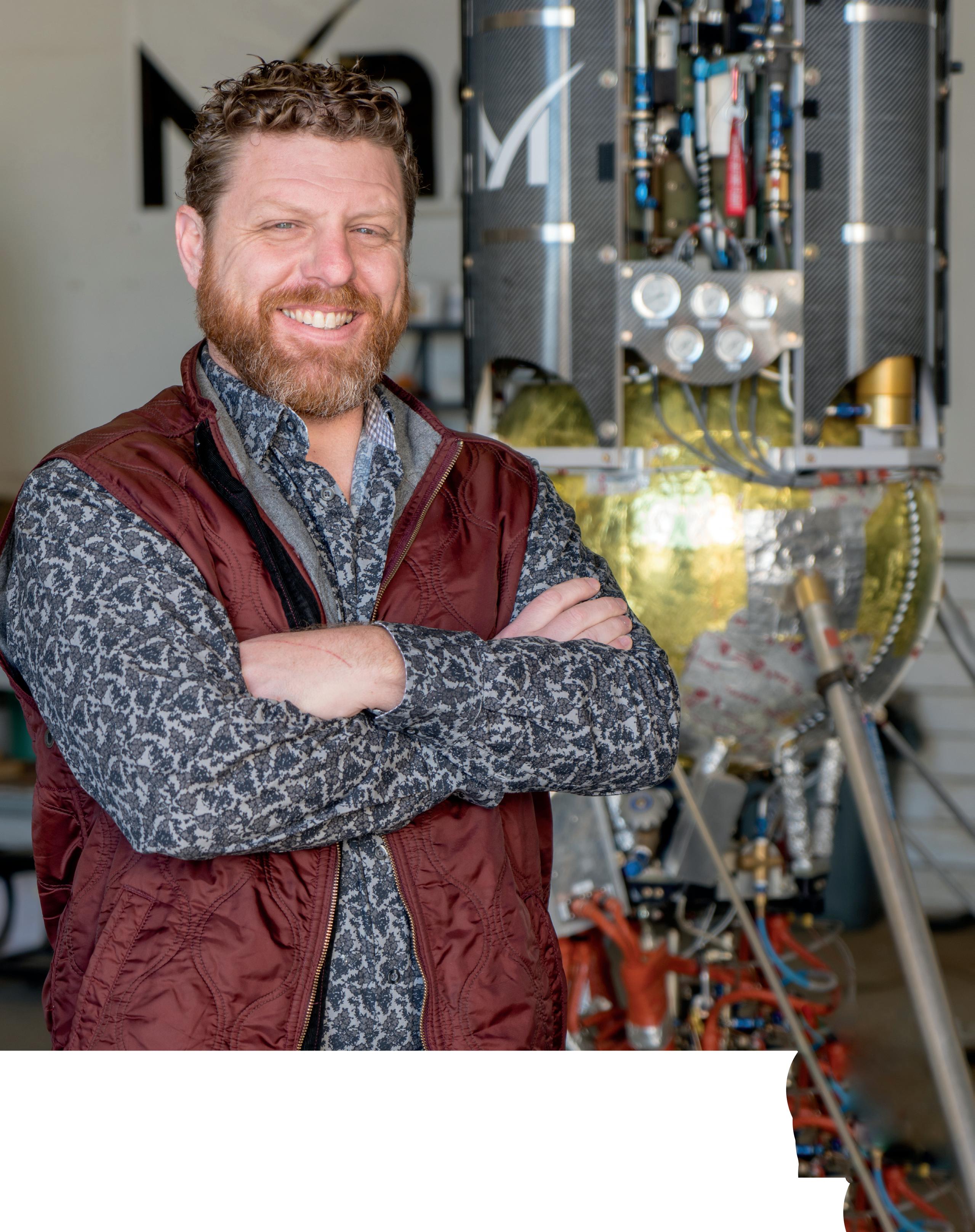
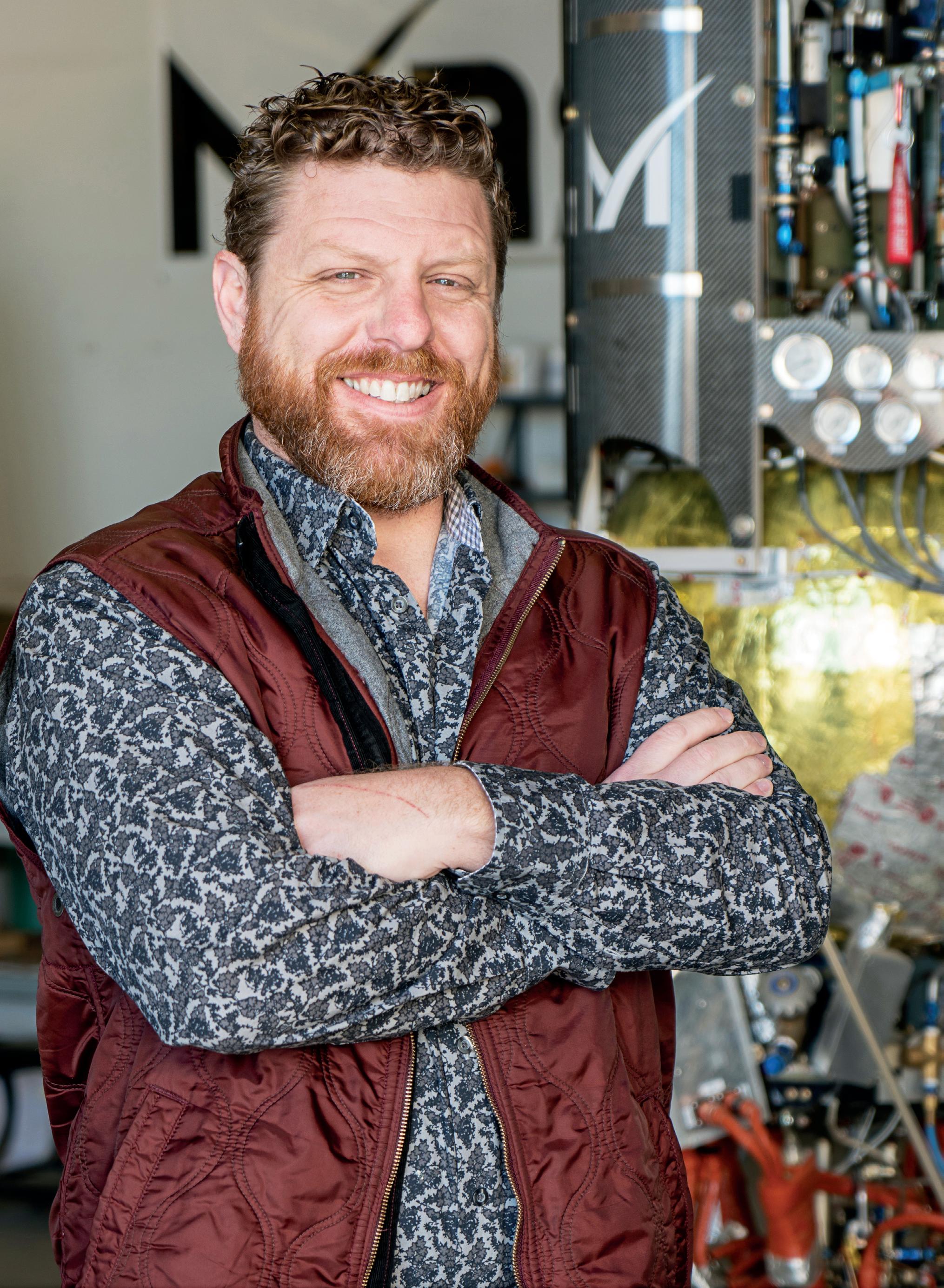
After finishing his MBA, Mahoney quickly realized he needed a career fueled with constant change, and he found exactly that. Facing challenges in the market, in technology shifts and even in the oftenexplosive world of space politics has kept Mahoney’s keen abilities well oiled. “Moon landing isn’t just a goal, it’s the first step in creating our next chapter—and will undoubtedly help shape the path of the future. In terms of business, space will be another market for us sooner than later.” As for his personal life, Mahoney splits his time between Atlanta; the team facility in Mojave, California; Washington, D.C.; and wherever the customers or conference of the week may be. Supporting his crazy entrepreneurial space efforts is his wife, Mandy Mahoney 06L. Each other’s biggest supporters, Mahoney insists his wife’s leadership work in Atlanta and beyond is as impactful as any journey could be —even one to the moon. The couple met in graduate school, married in 2009 and in 2014 had their son, Paul. Mahoney’s lessons-learned at Goizueta often reappear in his daily work like school-day mantras: “Point estimates are for suckers.” That one, he said, is uttered multiple times a week, as the Masten team is obligated to put point estimates on proposals and reports. And beyond the mantras, it’s the collective knowledge that gets leveraged, he said. “The decision sciences and managerial accounting skills are put to use every day, while the entrepreneurship and leadership skills are tested in the crucible of real-world application. I’m glad I have the background I do.”—Jennifer Corbett
DAVID GERMANY: on the value of doing good and doing well
Who do we want to be as a society?
It’s a question that fascinates David Germany 13WEMBA and has inspired a lifelong desire to give something back and to play a part in redressing some of the imbalance in society.
“At a time when the U.S. economy had one of the strongest decades of growth, more than 40% of the population is struggling to make $15 per hour. It begs the question: what’s fair and what’s the right thing to do?”
It’s this small sense of disquiet—an imperative to do good while doing well—that undergirds Germany’s two-decade career in finance, a career that has seen him progress through a number of leadership positions in banking to that of vice president and assistant treasurer with insurance corporation Protective Life. Throughout his professional life—which includes 17 years at Regions Bank—Germany has been instrumental in financing a breadth of projects in his native Alabama, simultaneously satisfying this quant’s need to solve problems through finance while fulfilling the desire to have a positive impact on people’s lives.
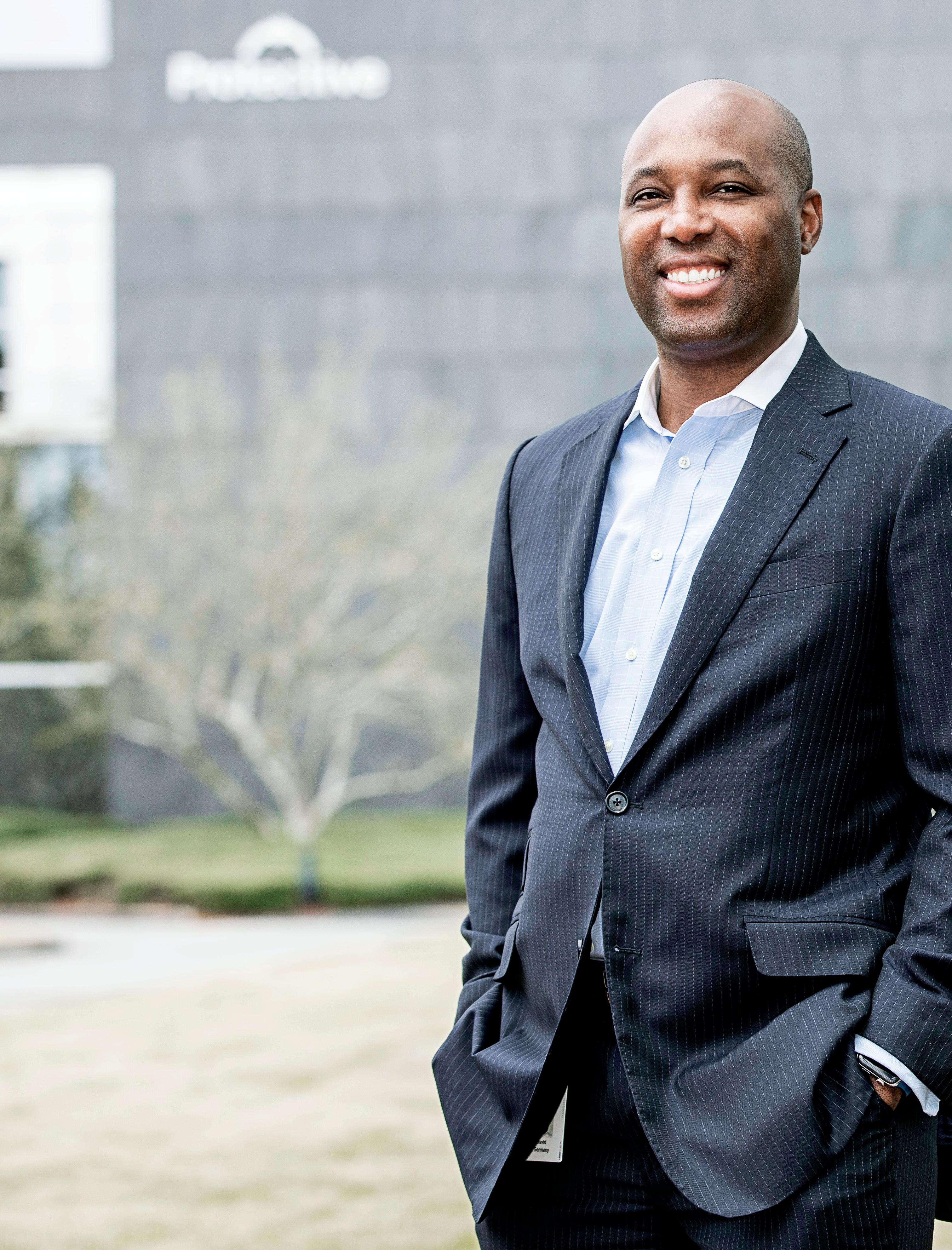
In 2019 he took on the position of chairman of the board at Birmingham Airport Authority— a decision, he said, that speaks to his belief in the “little city that could.”
“Birmingham has good bones. This is a city with strong legacy industries in iron and steel production, and we’re at an inflection point,” said Germany. “We’re building the solid infrastructure and transport systems to drive growth and to wrap some innovation and entrepreneurship around our industries. I want to be a part of that—to use my skills to help build that future. My work with the airport authority is another way of giving back to this community.”
Germany’s ties to Alabama are also deeply personal. His grandfather worked for U.S. Steel Corporation in Birmingham for more than 35 years. “I’m proud of what my grandfather stood for. His influence has always inspired me to extend that legacy and to make him proud.”
Germany also takes inspiration for the future from his four-year-old son. “It’s my ambition to build the kind of legacy within my own career that my son can be proud of too.”
A good deal of Germany’s success, he said, is keeping an “open mind” and giving free rein to his instinct for continuous learning and development—that same instinct that brought him to Goizueta to pursue his MBA in 2011.
“I still use all that I learned at Goizueta, from understanding our economy to knowing what it takes to create long-term value and competitive advantage. During my time there, I built a lifelong network. And I experienced a broadening and strengthening of perspective that will last across the entirety of my career.”—Áine Doris
CLASS NOTES
1960s
James Mortimer 67MBA of Matthews, NC, received an Emeritus Award for Meritorious Service to SCORE Charlotte. SCORE is a network of volunteer business mentors dedicated to helping small businesses.
1980s
Alan Rabb 82OX 84BBA of Greensboro, GA, served as a guest speaker at Oxford College in November 2019. He is founder and president of ACS Consulting Solutions LLC and a former senior vice president of finance at Coca-Cola.
John Chidsey 87JD/MBA of Coral Gables, FL, is CEO of Subway Restaurants. John was previously chairman and CEO of Burger King Holdings Inc.
1990s
Jeff Grosman 90MBA of Washington, DC, is chief of staff at Corcentric, which helps companies leverage technology to improve their procurement processes.
Steve Brown 95MBA of Winter Park, FL, is CEO of accesso Technology Group.
Syed Hoda 96WEMBA of Palo Alto, CA, is chief commercial officer and president North America at Crate.io.
Keith Burns 99OX 01BBA of Washington, DC, is president and director at Apex Physics Partners.
2000s
Lisa Ellis-James 01MBA of Duluth, GA, is COO at Ogletree Deakins, which specializes in labor and employment law.
Brad Ferguson 01EvMBA of Atlanta, GA, is CFO at Stratix Corporation, which provides managed mobility services.
Matt Freeman 01MBA of Atlanta, GA, is chairman and CEO of State National, a division of Markel, a specialty provider of property and casualty insurance services.
Matt Golden 01BBA of Decatur, GA, is cofounder and CEO of MapHabit. By assisting those with memory impairment in visualizing their daily tasks, the program aids in increasing independence and reducing caregiver stress.
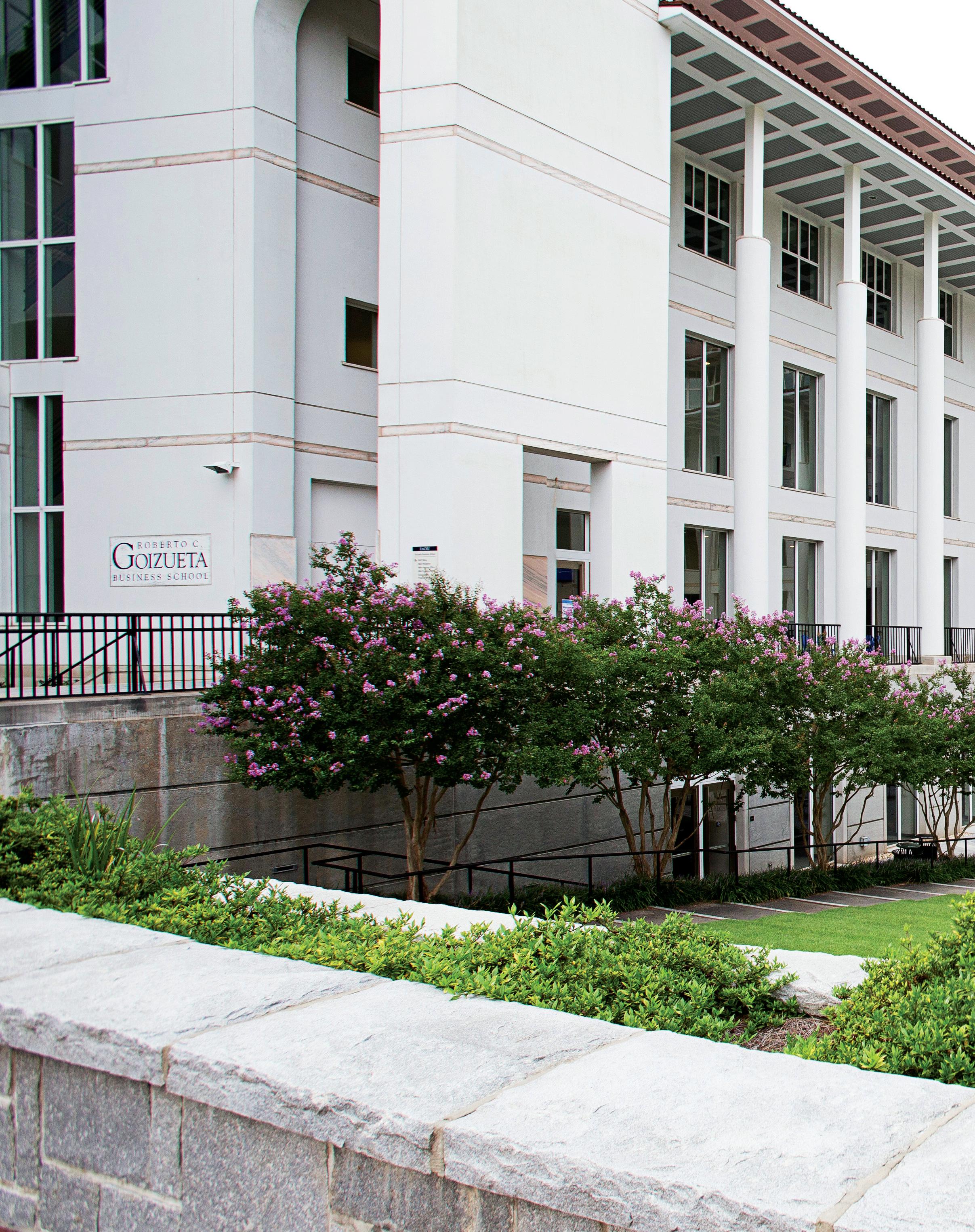
Russell Johnson 01MBA of Fairview, NC, is vice president and treasurer at CommScope, a global network infrastructure provider.
Jose Fernandez 04MBA of Weston, FL, is managing director for Avaya’s Latin America Multi-Country Region.
Rick Hasselman 04MBA of Los Altos, CA, is CFO at Podium. He was previously VP of finance and operations at Sumo Logic.
Allison Dukes 06WEMBA of Atlanta, GA, is deputy CFO at Invesco Ltd. until August 1, when she will become senior managing director and CFO.
Rochelle McAllister 06MBA of New York, NY, is legal counsel and chief compliance officer at LaSalle Investment Management.
For real-time updates, tweet your news and celebrations to our social media hub, The Social Index, using the hashtag #GoizuetaKudos.
Camille Bent 09JD/MBA of New York, NY, is an American Bankruptcy Institute 40 under 40 Honoree.
Theodore Brown 09BBA of Alpharetta, GA, is director of litigation support and forensic accounting services with Aprio LLP.
2010s
Matt Morris 10WEMBA of Alpharetta, GA, is a director at 1898 & Co., where he will lead the firm’s critical infrastructure cybersecurity practice.
Robert Oh 10WEMBA of Greensboro, NC, is EVP of digital transformation at Doosan. He was previously with Hanon Systems.
Will Gallagher 12BBA of Wagontown, PA, is partner at HunterMaclean, where he focuses on trusts, estates, taxation and corporate law.
Marina Levtov Cooley 14MBA of Atlanta, GA, is chief marketing officer at Lavva.
Holly Bryant Duncan 14EvMBA of Roswell, GA, is chief communications officer at Converse College. Holly was previously director of brand marketing for the Harlem Globetrotters.
Anthony Tuggle 14MEMBA of Decatur, GA, is chairman-elect of the National Kidney Foundation.
Aaron Carmack 15MEMBA of Mableton, GA, is COO at Rogers Electric.
Tiffany Willis 15WEMBA of Alpharetta, GA, is vice president of investor relations and corporate communications officer at Ingredion.
Elizabeth “Lizzie” Roediger 16MBA of WinstonSalem, NC, is CEO of Sunshine Beverages.
Benjamin Talbot 18MBA and Cecelia Zhang 10C of Decatur, GA, were married on October 26, 2019, at Holy Spirit Catholic Church in Atlanta.
Jack Malich 19BBA of Amityville, NY, is financial services paralegal at Cadwalader, Wickersham & Taft LLP.
IN MEMORIAM
Robert F. Atwater Jr. 50BBA of Atlanta, GA
Martin L. Karp 51BBA 55MBA of Savannah, GA
Claude H. Booker Jr. 55MBA of Sea Island, GA
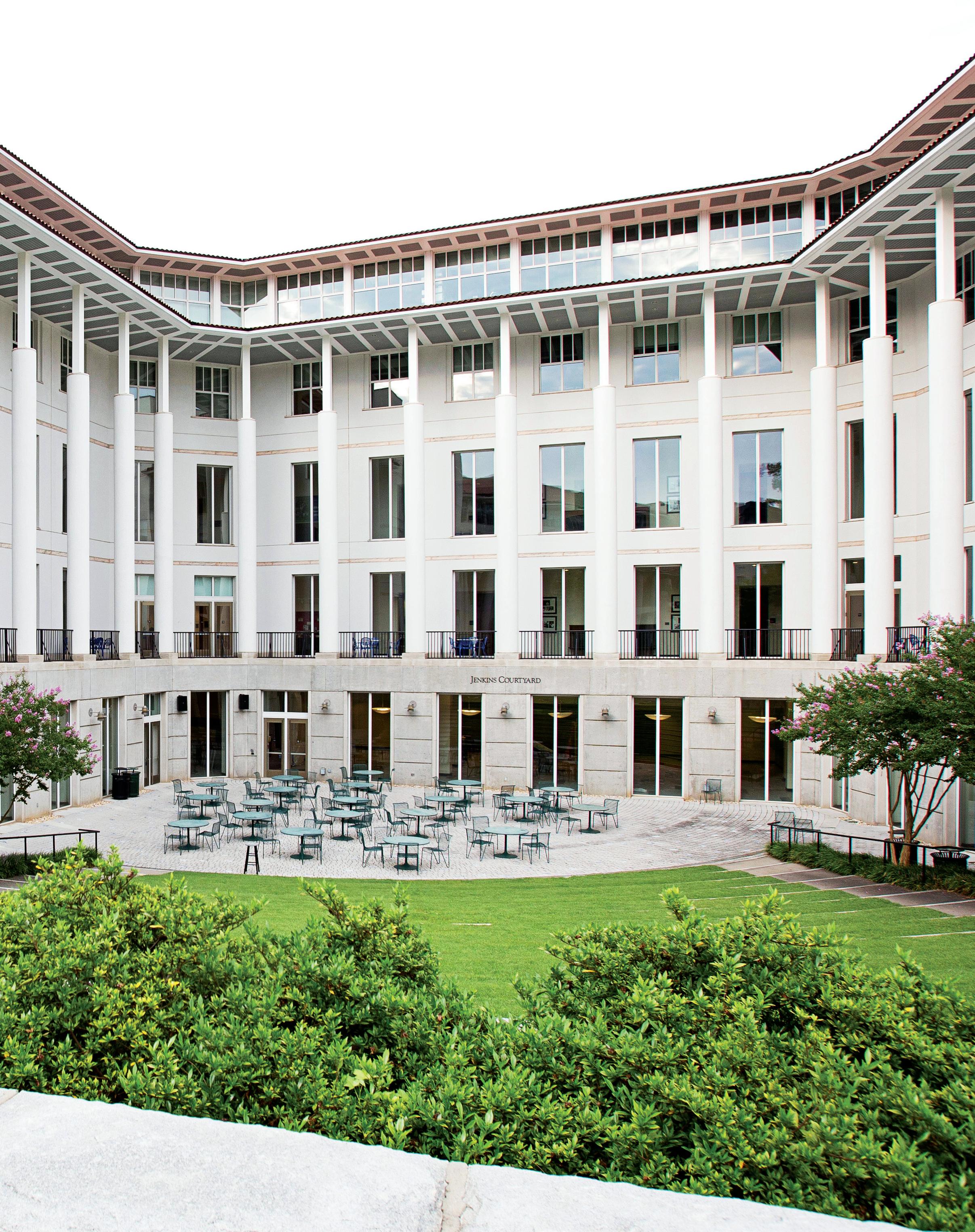
Emory B. Lewis 59BBA of Columbus, NC
Barney M. Moore Jr. 59BBA of Atlanta, GA
Carey McNeilly 61MBA of Charlotte, NC
Thomas E. Bartlett 69MBA of Fairbanks, AK
Robert R. Threatt 70MBA of Matthews, NC
Reginald Hiram Ross Jr. 73OX 76BBA
of Gainesville, FL
Robert C. Atkinson Jr. 75OX 77BBA
of Seabrook Island, SC
Jonathan Walker Good 84BBA of Seattle, WA
Amit Bhatnagar 08MBA of New York, NY
Dennis Lee 09BBA of Brooklyn, NY
Lance H. Perling 12WEMBA of Atlanta, GA
CELEBRATION OF LIFE
Goizueta community mourns loss of longtime finance professor
Last December, the Goizueta community suffered the passing of long- time and beloved professor Jim Rosenfeld. As an associate professor of finance, Rosenfeld cared deeply for Goizueta Business School and spent 30 years actively working to build the finance department. “It’s hard to imagine Goizueta without Jim Rosenfeld,” said Kristy Towry, former vice dean, John and Lucy Cook Chair and professor of accounting.
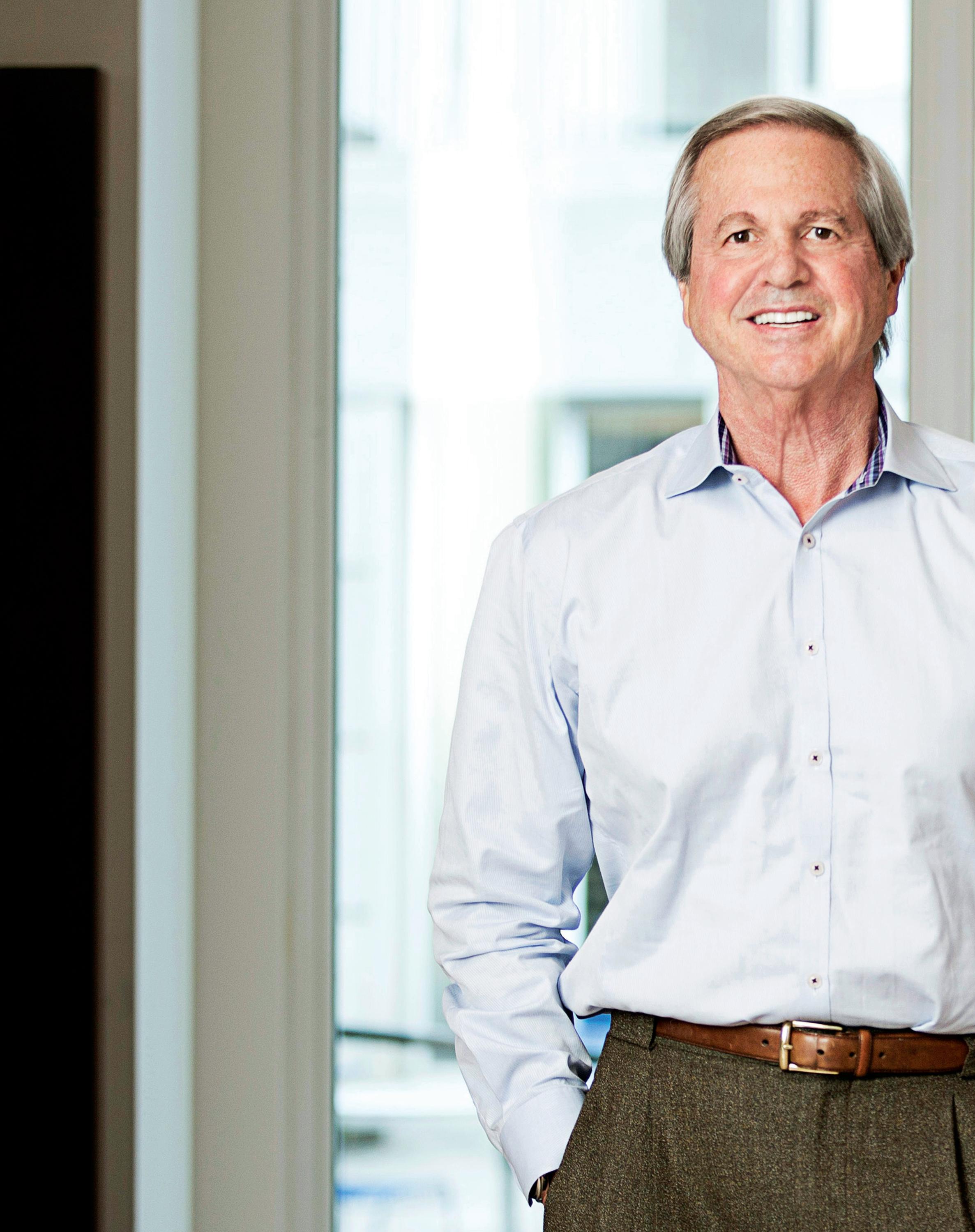
Prior to joining the Goizueta faculty, Rosenfeld taught at the graduate business school at the University of Georgia. He received his PhD from New York University, his MBA from Columbia University and his BA from the Wharton Business School at the University of Pennsylvania.
A consummate researcher, Rosenfeld could always be found hunched over a computer, feverishly writing or investigating new topics. His published works appeared in numerous academic journals including the Journal of Finance, the Journal of Financial Economics, the Journal of Financial and Quantitative Analysis, the Journal of Financial Research, Managerial and Decision Economics, The Accounting Review, Financial Management and the Journal of Money, Credit and Banking.
When he wasn’t working, Rosenfeld could be found on the tennis courts or driving around in his sports car. His infectious chuckle will long be remembered.
“He was a major force in our rise in stature over the last four decades,” Towry said. “More importantly, he was a beloved member of the Goizueta Business School family. I’ll miss his ready smile and his gentle soul.” —Patty Pohuski
MAKE YOUR MARK

When you change your perspective, you can change business for the better. In an ever-changing marketplace, we seek to make our mark. To achieve more. Build more. Do more. Create more. That’s the Goizueta Effect.




